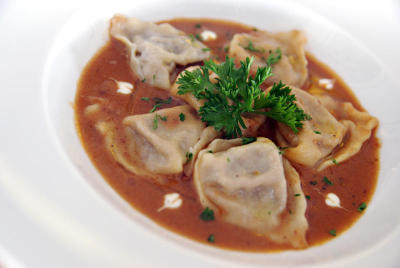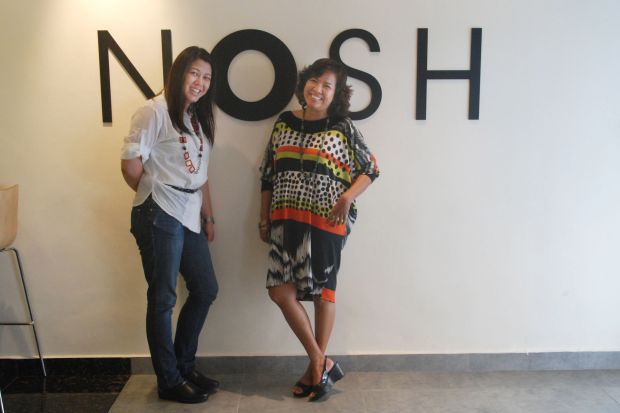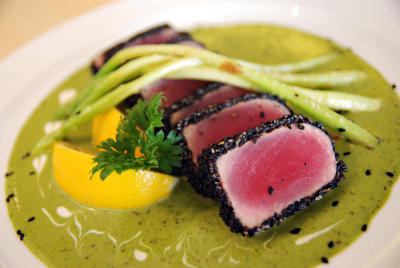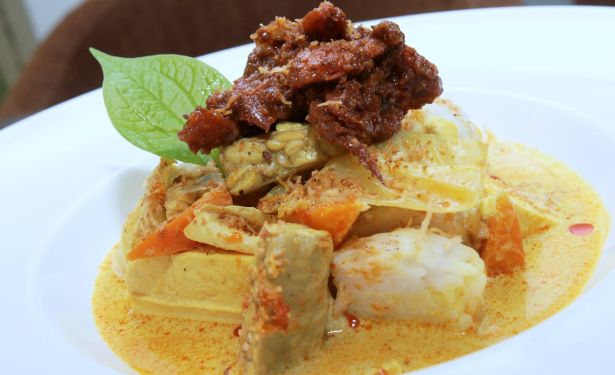NOSH has meals to suit a variety of tastes.
NOSH, a word that is associated with food and eating, interestingly has different connotations, depending on which part of the world you’re in. It could mean either light snacks and nibbles, or eating hungrily and greedily, hence alluding to a heartier meal.
Aptly, Nosh, one of the latest contemporary fusion restaurants to emerge in the Telawi 3 area of Bangsar, Kuala Lumpur, caters to both light snackers and hungry diners. The decor is simple and cosy, belying its power-packed menu.
From the restaurant’s exterior, the first thing that catches the eye is the signage with black typography standing out against a cheerful orange background. Upon closer inspection, one notices that the “O” in “Nosh” is thicker than the rest of the fonts, and (which I later discover from the owners) symbolises the plate that the meals are served on. It is also interesting to note that on their website, the animated version of this logotype features the “O” as a rotating image to depict chicken, beef and fish. Nosh is pork-free, but serves alcohol.
The restaurant serves lunch and dinner, but with brunch becoming increasingly popular among urbanites, Nosh also provides a full-fledged brunch menu on weekends and most public holidays from 9.30am to 3pm.
Light tapas or Noshlettes are also served throughout the day on weekdays, and after 3pm on weekends and public holidays.
“Dining at Nosh is like going on an exciting food journey, and embarking on a culinary adventure. It is about providing the familiar (and safe/comfortable), yet with a nice surprising twist to it,” Ann Lee, one of the founders of the restaurant, enthuses, during a media menu tasting session.
This is evident in Lee and her partner, Judith Sakata’s favourite dish on their menu, the Smoked Duck and Gorgonzola (RM31), a punchy twist on the classic spicy aglio olio spaghetti.
We commenced with the Seafood Soup (Soup of the Week, RM16), which teemed with prawns, squid and scallops. It was flavourful, yet did not have an overpowering “fishy” taste/smell (one reason I often avoid ordering anything with fish/seafood). This was “just right”.
For Lee and Sakata, what started out as a dream to own their own cosy cafe, blossomed into a full-fledged trendy restaurant. Together, they have over two decades of experience and expertise in the food and beverage industry.
Lee first learned to cook from her mother. Coming from a family inclined towards medicine, she originally trained as a nurse, and later also graduated in English Literature. She discovered that her true calling was in cooking when she started working part-time in a bakery while studying in London. When she returned to Malaysia, she became a partner at the famous Kuala Lumpur cake specialist, Just Heavenly.
Sakata, who handles the business side of Nosh, is no less passionate about food. She first served as an apprentice pastry chef in Tokyo before becoming an executive pastry chef at YTL Autodome in Malaysia and then going on to manage the pastry division of YTL Hotels and Properties.
The two women met and became fast friends in 2009 when Sakata joined Just Heavenly as the director of operations in its central kitchen, where she ran the day-to-day mechanics of production. The mother of two grown-up sons then moved to Air Asia as its product development manager, where she revamped the airline’s and its affiliates’ menus.
This year, the two enterprising women joined forces to set up Nosh. Their happy partnership brings together a marriage of tastes, as can be seen in the combination of flavours in their menus which offer a variety of fusion meals, with Japanese, English/European and local Malaysian influences.
When I first set eyes on the Seared Ahi Tuna (RM52), I was struck by how much it looked like maki (sushi rolls), minus the vinegared rice. However, with its lightly seared texture and the wasabi-based sauce, it had the “bite” of sashimi. And for someone who avoids “raw” or “rare” (like bloodied steaks) food like the plague, I have to admit that I actually liked this. The black sesame seed crust added extra crunch to the tuna which went very well with the wasabi and lime sauce.
The Roasted Percik (RM29) is a variation of the traditional Malaysian-style ayam percik. The tender and perfectly-marinated chicken thigh bathed in percik sauce, comes with a Mediterranean twist. In place of rice is a bed of flavourful couscous. According to the partners, this is one of the most popular items on their menu. “It’s safe and yet different, it’s healthier but just as tasty, if not more,” Sakata interjects.
It is easy to see why Lee and Sakata work so well together. Not only do they share a passion for all things food-related, but they even complement each other in personality. While Lee, who hails from Kuala Lumpur, is bubbly and talkative, Sakata, who was born in Kuching and spent her early years in Kota Kinabalu and later Kuala Lumpur, is often the contemplative observer.
Both women, who are married, are thrilled that their families are extremely supportive of their business venture, which is a fulfillment of their long-time goal.
On the name of their brainchild, Lee and Sakata say that they wanted something that was simple and catchy, as well as easy to pronounce. Hence, they steered clear of foreign-sounding names with many syllables.
“Basically, we wanted something that anybody could pronounce, even those who didn’t speak much English, so no R’s or L’s,” Lee explains.
Nosh’s food, says Lee, is freshly prepared daily at the restaurant, and even their ice-cream and pasta are made from scratch.
I had the opportunity to try two other pastas on their menu – the Pesto Basilico (RM21) and Handmade Beef Tortellini (RM34). The one with pesto is the most popular pasta on the menu, but my favourite, among the three, is the tortellini – tender beef cheeks and mascarpone cheese-stuffed navel-shaped pasta in a luxuriously creamy beef sauce. It literally melted in the mouth with every bite. I felt that it was quite different from tortellini dishes that I’ve tasted elsewhere which come, Malaysian-style, with regular tomato-based sauce.
The Nosh Rack (RM52) was extremely juicy, well-marinated and tender prime lamb. It was served with sauteed spinach and olives, on a well-cooked breaded portobello mushroom. Though the price seemed a tad high, the portions were huge.
If you’re a chocoholic and dessert lover, I highly recommend the Rich Chocolate Sundae (RM25) with its chocolate brownie, chocolate sauce, chocolate crumble and home-made chocolate ice cream.
 Beef Tortellini is a melt-in-the-mouth dish consisting of tortellini filled with succulent beef cheeks and mascarpone, in a luxurious gravy.
Beef Tortellini is a melt-in-the-mouth dish consisting of tortellini filled with succulent beef cheeks and mascarpone, in a luxurious gravy.
The Big Apple (RM16) initially struck a chord of curiosity in me because of its name. Did it have something to do with New York? Was it just a dressed-up apple? It turned out to be a hearty portion of apple cinnamon cake served with a winning combination of warm custard, vanilla ice cream and fresh strawberries.
Nosh offers a variety of signature hot beverages like the Cassis Mocha-Cino (RM14) which contains a hint of blackcurrant syrup, and the aptly named Chocolate Trinity (RM14) which combines dark, milk and malt chocolates.
Their cold beverages include the Strawberry Harvest (RM26), which if you’re a sangria fan like me, will blow you away with its fruity goodness and just the right amount of alcohol.
Even though Lee and Sakata have a young team on their workforce, they believe that talent can be developed and great potential can be realised with good guidance and direction, as well as a conducive working environment.
To minimise their carbon footprint, the environmentally-conscious team believe in using fresh rather than processed ingredients as much as possible, and buying local produce, with the exception of specialised ingredients which can only be obtained from overseas.
“We don’t cut corners and we don’t serve what we would not put in our own mouths. We serve only what we ourselves would want to eat,” said Sakata.







